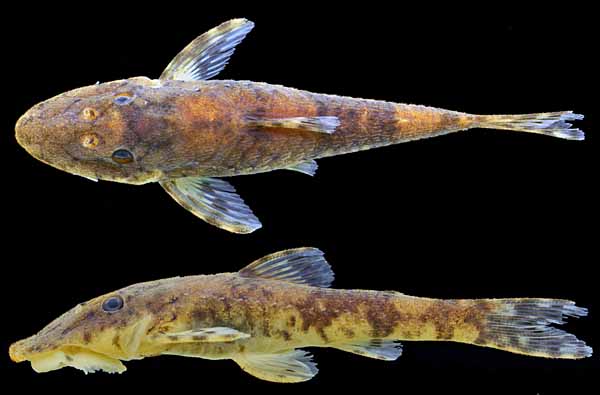Rhinotocinclus hardmani: Unterschied zwischen den Versionen
Es (Diskussion | Beiträge) (→Typen) |
Es (Diskussion | Beiträge) |
||
| Zeile 1: | Zeile 1: | ||
__NOTOC__ <!--† ♂♀ --> | __NOTOC__ <!--† ♂♀ --> | ||
| − | =='''{{aut|Lehmann A.}} ''et al.'', 2022'''== | + | =='''{{aut|(Lehmann A.}} ''et al.'', 2022)'''== |
<!--------------------------- Taxonavigation --------------------------> | <!--------------------------- Taxonavigation --------------------------> | ||
{| style="width:100%; background:#fcfcfc; margin-top:2em;" | {| style="width:100%; background:#fcfcfc; margin-top:2em;" | ||
| Zeile 8: | Zeile 8: | ||
{{Parotocinclus}}<br /> | {{Parotocinclus}}<br /> | ||
| + | |||
| + | == Synonyme == | ||
| + | ''[[Parotocinclus hardmani]]'' {{aut|Lehmann A.}} ''et al.'', 2022 | ||
<!--------------------------- Platz für Abbildungen --------------------------> | <!--------------------------- Platz für Abbildungen --------------------------> | ||
| style="width:50%; padding:0 1em; background:#f5fffa; border:1px solid #ccc;" id=mf-sow| | | style="width:50%; padding:0 1em; background:#f5fffa; border:1px solid #ccc;" id=mf-sow| | ||
| − | + | [[Datei:Rhinotocinclus hardmani.jpg|600px|thumb|left|''Rhinotocinclus hardmani'' (Holotypus) -- (C) {{aut|Reis & Lehmann A.}}, 2022 in: ''Neotropical Ichthyology'', '''20''' (2): e220002.]] | |
|} | |} | ||
== Typen == | == Typen == | ||
| Zeile 23: | Zeile 26: | ||
== Verbreitung == | == Verbreitung == | ||
Guyana: in Nebenflüssen des Potaro-Rivers unterhalb des Guayana-Schildes, Potaro-Siparuni. | Guyana: in Nebenflüssen des Potaro-Rivers unterhalb des Guayana-Schildes, Potaro-Siparuni. | ||
| − | |||
| − | |||
== IUCN Status == | == IUCN Status == | ||
| Zeile 45: | Zeile 46: | ||
==Literatur== | ==Literatur== | ||
| − | {{Lehmann A. et al., 2022}}[: 70, Fig 1, <span style="color: red">'''!!'''</span>] | + | {{Lehmann A. et al., 2022}}[: 70, Fig 1, <span style="color: red">'''!!'''</span>, als ''[[Parotocinclus hardmani]]''] |
| + | {{Reis & Lehmann A., 2022}}[:61, Fig 34, Farbfoto, Beschreibung, Verbreitung, als ''[[Rhinotocinclus hardmani]]''] | ||
===Links=== | ===Links=== | ||
| Zeile 54: | Zeile 56: | ||
[[Category:Roberto Esser dos Reis taxa]] | [[Category:Roberto Esser dos Reis taxa]] | ||
[[Category:art]] | [[Category:art]] | ||
| + | [[Category:4.0]] | ||
Version vom 4. September 2022, 11:41 Uhr
(Lehmann A. et al., 2022)
|
Familie: Loricariidae SynonymeParotocinclus hardmani Lehmann A. et al., 2022 |
Typen
Holotypus: CSBD F3618 (zuvor AUM 62850) .
Siehe: Eschmeyer, W.N., Fricke, R. & Van der Laan, R. (eds.) 2024. Catalog of Fishes electronic version
Typusfundort: Kuribrong River bei den Grass Shoals Stromschnellen, Potaro-Siparuni, Guyana, 5°28'44.7"N, 59°31'54.4"W (Karte).
Etymologie
Benannt zu Ehren von Michael Hardman, ehemaliger Techniker am Zentrum für Biodiversität, Illinois Natural History Survey, Champaign, Illinois, USA, der 1998 Exemplare sammelte und sie erstmals als unbeschriebenes Art erkannte.
Verbreitung
Guyana: in Nebenflüssen des Potaro-Rivers unterhalb des Guayana-Schildes, Potaro-Siparuni.
IUCN Status

EX Extinct (ausgestorben)
EW Extinct in the Wild (in der Natur ausgestorben)
CR Critically Endangered (vom Aussterben bedroht)EN Endangered (stark gefährdet)
VU Vulnerable (gefährdet)
NT Near Threatened (potenziell gefährdet)
LC Least Concern (nicht gefährdet)
RE Regionally Extinct (regional oder national ausgestorben)DD Data Deficient (ungenügende Datengrundlage)
NE Not Evaluated (nicht beurteilt)
Status: Stand 15.2.2022: NE Not Evaluated (nicht beurteilt)
Gefahren für diese Art: (nicht beurteilt)
Literatur
- Lehmann A., P., Lujan, N.K. & Reis, R.E. 2022. A New Species of Armored Catfish (Loricariidae: Hypoptopomatinae) Syntopic and Superficially Similar to Parotocinclus collinsae, from the Potaro River Basin, Guyana. Ichthyology & Herpetology, 110 (1): 69–76. (doi) Zitatseite [: 70, Fig 1, !!, als Parotocinclus hardmani]
- Reis, R.E. & Lehmann A., P. 2022. A new genus of armored catfish (Siluriformes: Loricariidae) from the Greater Amazon, with a review of the species and description of five new species. Neotropical Ichthyology, 20 (2): e220002. (doi) Zitatseite [:61, Fig 34, Farbfoto, Beschreibung, Verbreitung, als Rhinotocinclus hardmani]
